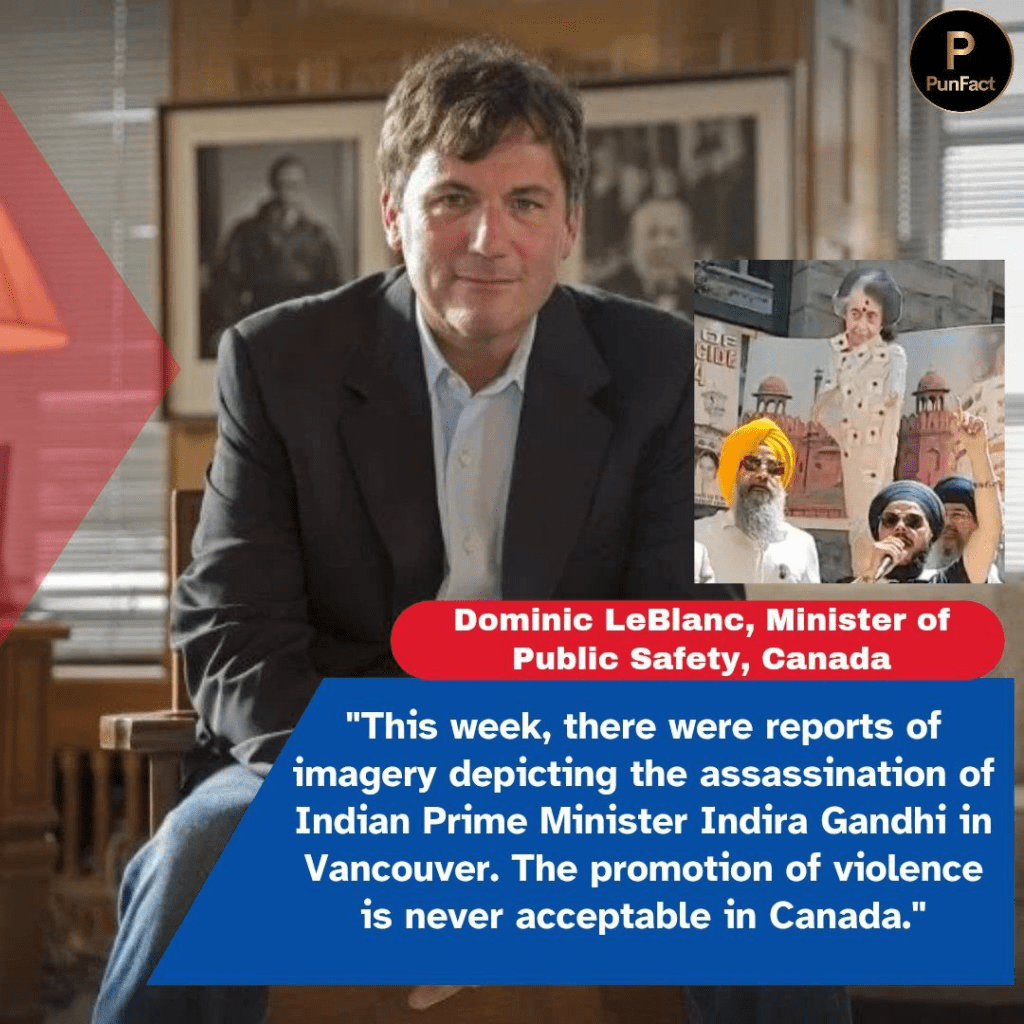AI Generated Summary
- He pointed out that this incident is not isolated, recalling a similar float in Brampton a few years ago and recent threats by Gurpatwant Singh Pannun, a leader of the Khalistan movement and spokesperson for Sikhs for Justice (SFJ).
- The prominence of a bindi on the forehead of Indira Gandhi is to make doubly sure the intended targets are Indians in Canada,” he said.
- He condemned the display of images in Vancouver depicting the assassination of former Indian Prime Minister Indira Gandhi, stating, “The promotion of violence is never acceptable in Canada.
In recent weeks, Canada has found itself embroiled in controversy as reports have emerged of disturbing imagery promoting violence and hate speech linked to Khalistan extremism. This growing trend has raised serious concerns among Indo-Canadian communities and lawmakers, who are urging the government to take decisive action to curb these dangerous activities.
Dominic A LeBlanc, the Minister of Public Safety, Democratic Institutions and Intergovernmental Affairs, highlighted the severity of the issue on social media platform X. He condemned the display of images in Vancouver depicting the assassination of former Indian Prime Minister Indira Gandhi, stating, “The promotion of violence is never acceptable in Canada.”

The imagery in question shows graphic depictions of Gandhi’s body riddled with bullet holes, surrounded by her bodyguards who turned assassins. Such depictions are seen as a direct attempt to instill fear among Canadians of Indian origin, particularly by Khalistan supporters. Indo-Canadian lawmaker Chandra Arya, who represents Nepean in the House of Commons, expressed his alarm over these incidents, drawing attention to their impact on the community.
Khalistan supporters in Vancouver with posters, of Hindu Indian prime minister Indira Gandhi body with bullet holes with her bodyguards turned assassins holding their guns, are again attempting to instil fear of violence in Hindu-Canadians.
— Chandra Arya (@AryaCanada) June 8, 2024
This is continuation of threats with a… pic.twitter.com/ia8WQL4VtH
“Khalistan supporters in Vancouver with posters of Indian Prime Minister Indira Gandhi’s body with bullet holes, and her bodyguards turned assassins holding their guns, are again attempting to instill fear of violence in Canadians,” Arya remarked. He pointed out that this incident is not isolated, recalling a similar float in Brampton a few years ago and recent threats by Gurpatwant Singh Pannun, a leader of the Khalistan movement and spokesperson for Sikhs for Justice (SFJ). Pannun has been vocal in his calls for Indians to leave Canada and return to India.
Arya’s statement underscores a growing concern within the Indo-Canadian community about the unchecked rise of extremist activities. He called on Canadian law enforcement agencies to take immediate action, warning that the use of violent imagery could lead to real-world violence if left unchallenged. “With pictures of guns readily being used to convey the message, it may lead to something real if this is left to continue unchallenged. The prominence of a bindi on the forehead of Indira Gandhi is to make doubly sure the intended targets are Indians in Canada,” he said.
The Indian government has long voiced its concerns about the space given to separatists, terrorists, and anti-India elements in Canada. This issue has been a point of contention between the two nations, with India urging Canada to take stronger measures against these groups. The recent events in Vancouver have only intensified these calls, putting additional pressure on the Canadian government to address the growing threat of Khalistan extremism within its borders.
The current administration under Prime Minister Justin Trudeau faces a critical test. While Canada prides itself on being a nation that upholds freedom of speech, there is a fine line between free expression and the incitement of violence and hate. The government must navigate this delicate balance to ensure the safety and security of all its citizens while maintaining its democratic principles.
With Canada being seen as going ‘soft’ on Khalistani extremists, the pro-Khalistan extremists in Canada get spurred on, even as the movement finds no support in Punjab, yet the demand keeps resurfacing by minuscule sections of Sikh diaspora abroad.
As the debate continues, the Indo-Canadian community, along with concerned lawmakers, await concrete actions from the government to address this pressing issue. The resolution of this matter will not only impact Canada’s domestic harmony but also its international relations, particularly with India. The time for decisive action is now, to prevent the escalation of violence and ensure that Canada remains a safe and inclusive society for all.
The opinions expressed in this article are those of the author. They do not purport to reflect the opinions or views of Khalsa Vox or its members.




